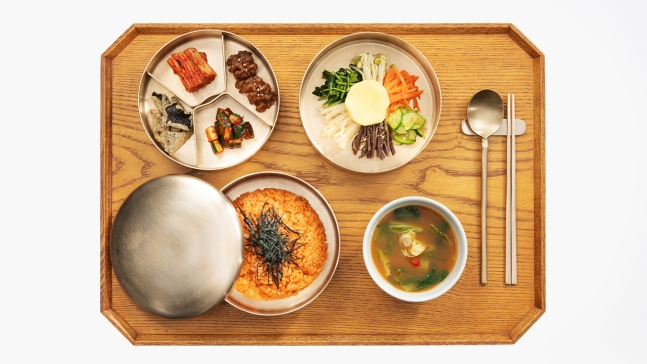Food & Beverage
Korean food unappealing on lack of promotions: study
A study urges fostering foreign chefs of Korean cuisine abroad and creating a proper brand image
By Dec 29, 2022 (Gmt+09:00)
2
Min read
Most Read
LG Chem to sell water filter business to Glenwood PE for $692 million


Kyobo Life poised to buy Japan’s SBI Group-owned savings bank


KT&G eyes overseas M&A after rejecting activist fund's offer


StockX in merger talks with Naver’s online reseller Kream


Mirae Asset to be named Korea Post’s core real estate fund operator



Despite the global popularity of Korean food, a poll says the cuisine has a long way to go in seeing development as a business sector.
The Korea Commerce of Industry and Commerce on Wednesday announced the results of its poll of 182 contestants in a competition for ideas on the industrialization of Korean food conducted from Sep. 10 to Oct. 28. The respondents were asked about their perceptions of the business side of Korean food.
On the level of success of Korean food's globalization, over half answered positively with 42.1% saying "good" and 8.6% "very good."
The chamber said the study's results reflect the recent popularity of Korean cuisine chain restaurants around the world and record-high exports of Korean foods like mandu (dumplings) and ramyeon (instant noodles).
Yet many cited problems with the cuisine's business success, with only 20.4% calling the performance "good" and just 5.3% "very good."
Despite the global popularity of Korean food, the study cited the sector's lack of a value chain and proper industrial structure.
Among the reasons mentioned for Korean food's poor business development, 48.3% cited lack of awareness and promotion, 46.7% no standardized names and recipes, and 33.5% difficulty in ingredient supply.
With multiple responses allowed, the majority 69.1% recommended that Korean food pursue a global image of "a healthy and well-being food," followed by 42.1% saying "a young and hip image," 41.4% "a high-end and static image," and 20.3% "a distinctive image such as spicy taste."
"Japan and Thailand in the past succeeded in industrializing their cuisines by forming clear images of their domestic foods," said Kim Bo-seok, a team manager at Korea Food Promotion Institute. "Likewise, a key task for Korean food is to find what kind of branding and image will earn international recognition."
The grand prize winner of the contest was Jeong Hyun-woo, 58, a Seoul resident whose submission was titled "Measures for Developing Foreign Experts in Korean Cuisine."
He stressed raising the number of Korean restaurant startups abroad by nationals of a host country to truly industrialize Korean food, proposing the setup of an institute abroad teaching Korean culinary arts.
"Just as Koreans open restaurants for pho and pizza in Korea, I believe that true industrialization of Korean food is possible only after people abroad set up restaurants for ssambap (rice wrapped in cabbage) and bibimbap (rice mixed with meat, vegetables and spicy red pepper paste)," Jeong added.
To implement the ideas for business development of Korean cuisine received through this contest, the chamber plans to promote joint projects with related bodies after analyzing feasibility.
Write to Soo-Jung Ha at agatha77@hankyung.com
More to Read
-
 Food & BeveragePulmuone to supply food ingredients to 18 US universities
Food & BeveragePulmuone to supply food ingredients to 18 US universitiesDec 13, 2022 (Gmt+09:00)
1 Min read -
 Food & BeverageKorea's agro-food exports set record of $8 billion in 11 months this year
Food & BeverageKorea's agro-food exports set record of $8 billion in 11 months this yearDec 05, 2022 (Gmt+09:00)
1 Min read -
 AgTechFood giant Nongshim exports two container units of smart farm to Oman
AgTechFood giant Nongshim exports two container units of smart farm to OmanNov 23, 2022 (Gmt+09:00)
1 Min read -
 Korean foodCJ CheilJedang serves up K-food for Qatar World Cup fans
Korean foodCJ CheilJedang serves up K-food for Qatar World Cup fansNov 22, 2022 (Gmt+09:00)
1 Min read -
 Korean foodCJ CheilJedang to rev up Korean food sales in Europe
Korean foodCJ CheilJedang to rev up Korean food sales in EuropeJul 06, 2022 (Gmt+09:00)
1 Min read
Comment 0
LOG IN


